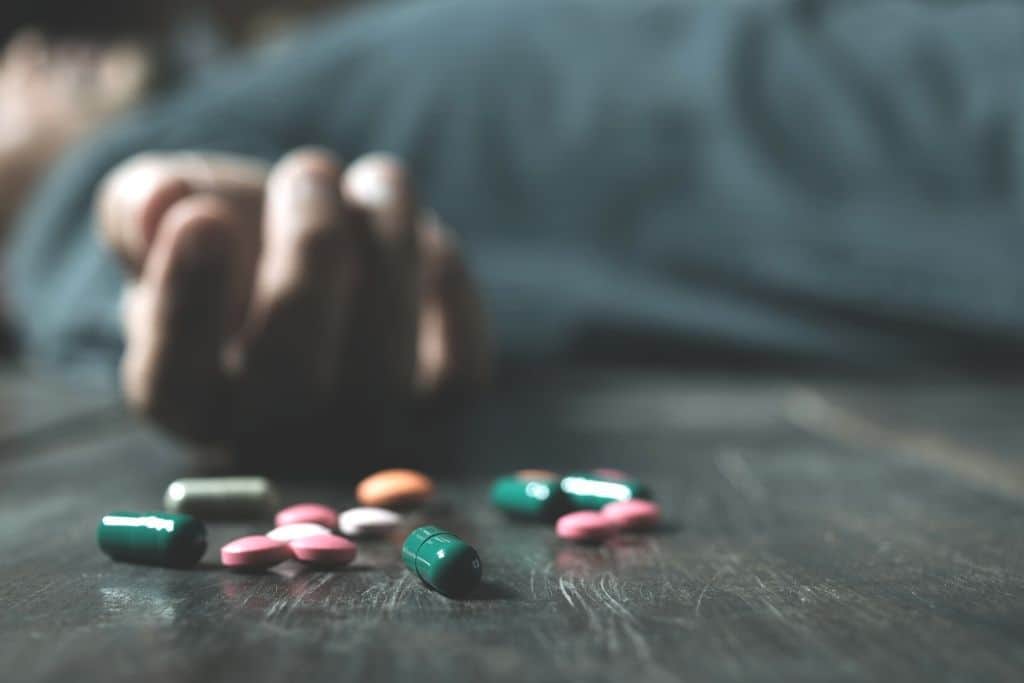What Is Codeine Linctus?
Codeine linctus is a cough medicine available in places like the U.K. and Australia. The codeine linctus active ingredient is codeine phosphate. Although codeine linctus is not available in the United States, codeine phosphate is a Schedule II controlled substance in the U.S.
Codeine linctus works when someone’s central nervous system is overstimulated and leads them to feel like they need to cough. The reflex is blocked when the cough has no purpose (for example, you’re coughing because of overstimulation and not because you need to clear phlegm). The urge to cough occurs in your brain, specifically the brainstem. Opioids like codeine block this urge by working on mu and kappa opioid receptors in the brainstem. Codeine linctus comes in a clear oral liquid.

Codeine Linctus Side Effects
Codeine linctus side effects include:
- Rapid or slow heartbeat
- Low blood pressure
- Slowed breathing
- Nausea or vomiting
- Mood changes
- Confusion
- Dizziness
- Drowsiness

Get Your Life Back
Find Hope & Recovery. Get Safe Comfortable Detox, Addiction Rehab & Dual Diagnosis High-Quality Care.
Hotline(844) 597-1011Codeine Linctus High
Codeine linctus can get you high because of the codeine. A high is particularly likely if someone takes larger doses of this drug. Codeine linctus is one of the less potent opioids, so the high wouldn’t be as significant as what a person might feel with other opioid prescription drugs.
Some people are genetically more likely to get high on codeine linctus than other people, due to an enzyme in the liver called CYP2D6. This enzyme breaks codeine down into morphine faster in some people than in others. This can lead to codeine taking effect more quickly than expected, leading to a high or an overdose in some cases.
Codeine Linctus Dose
General codeine linctus dose guidelines include the following:
- For cough in adults, the recommended dose is 15 mg (there is 15 mg in every 5 ml of the drug) every four hours, up to a max of four doses per day.
- No codeine linctus dose is recommended for children because this drug has the risk of breathing problems and other complications.
- A reduced dose may be needed in older individuals.
Codeine Drug Warning
Codeine linctus can be habit-forming. For this reason, it is important to follow your doctor’s instructions for taking codeine linctus. Certain people are advised against taking it altogether, including those who:
- Are addicted to opioids
- Have liver problems
- Have breathing problems, like slowed breathing or an acute asthma attack
- Have serious bowel problems like paralytic ileus
- Have increased pressure in their brains or a head injury
- Break codeine down into morphine more quickly than expected
- Are under the age of 18 years
- Are breastfeeding
Get Help. Get Better. Get Your Life Back.
Searching for Accredited Drug and Alcohol Rehab Centers Near You?
Even if you have failed previously and relapsed, or are in the middle of a difficult crisis, we stand ready to support you. Our trusted behavioral health specialists will not give up on you. When you feel ready or just want someone to speak to about therapy alternatives to change your life call us. Even if we cannot assist you, we will lead you to wherever you can get support. There is no obligation. Call our hotline today.
(844) 597-1011What Is Codeine?
Codeine is an opioid pain reliever narcotic. It is a controlled substance in the U.S. and many other countries. Codeine is a natural opioid, meaning that it is derived from morphine and is not chemically man-made. It is considered one of the milder opioids available: one milligram of codeine equates to roughly 0.15 milligrams of morphine.
How Does Codeine Work?
When you take codeine, your liver breaks it down into morphine. Then, it crosses into your brain and binds to opioid receptors. Opioid receptors can alter how you feel pain and reduce the urge to cough.
Opioids like codeine slow the function of the central nervous system, which can include essential functions like respiration. If you take too much of an opioid, it can slow your respiration to the point that you overdose or stop breathing altogether, which is one of the biggest risks of these drugs.

Are There Any Risks to Taking Codeine?
Other risks of codeine-based products include physical dependence and addiction. With a physical dependence on codeine, a person has used the drug for a while until their body feels like it needs codeine to function normally. Then, if someone were to stop taking it suddenly after developing a tolerance, they would go through withdrawal symptoms.
Codeine and other opioids are so addictive because they trigger a release of dopamine and feel-good neurotransmitters when they enter the brain. This then starts a cycle of addiction: your brain compels you to continue seeking out whatever it was that released the brain chemicals that felt pleasurable, over and over despite negative consequences.
First-class Facilities & Amenities
World-class High-Quality Addiction & Mental Health Rehabilitation Treatment
Rehab Centers TourRenowned Addiction Centers. Serene Private Facilities. Inpatient rehab programs vary.
Addiction Helpline(844) 597-1011Proven recovery success experience, backed by a Team w/ History of:
15+
Years of Unified Experience
100s
5-Star Reviews Across Our Centers
10K
Recovery Success Stories Across Our Network
- Low Patient to Therapist Ratio
- Onsite Medical Detox Center
- Comprehensive Dual-Diagnosis Treatment
- Complimentary Family & Alumni Programs
- Coaching, Recovery & Personal Development Events
Signs of Codeine Addiction
There are some key signs of abuse of any opioid, but the most common side effect of medications containing codeine is nausea, especially in cough syrups. Those who take more than the recommended dose of one of these medications are likely to become nauseous. Therefore, they may also keep anti-nausea medications handy.
Other effects of codeine abuse include:
- Anxiety or depression
- Mood swings
- Drowsiness
- Sleeping more than usual
- Nodding off
- Decreased appetite
- Weight loss
- Clammy hands or feet
- Stomach pain
- Constipation
- Itching
- Slowed breathing
- Changes in vision
Over long periods, codeine abuse can cause an increase in lung infections, bowel damage, sleep disorders, irregular heart rate, and even brain damage. Beyond the physical effects, drug addiction tends to have a profound impact on life satisfaction. As the individual becomes increasingly preoccupied with obtaining and taking the drug, relationships, and responsibilities suffer. The person may lose friends, have difficulties with family members, and find it difficult to make it to school or work. Constant drowsiness and mood swings make it nearly impossible to focus.
All of these are signs that addiction to some kind of substance has developed. According to the National Institute on Drug Abuse, there were 2.1 million Americans addicted to prescription opioid painkillers in 2012. It’s easy to become addicted to an opiate and difficult to stop using, as the brain eventually stops producing the chemicals that stimulate the reward center. After enough tolerance has developed, an addicted individual will need to take the opiate just to feel any level of pleasure. Anhedonia, the inability to feel pleasure, is a common symptom of opiate addiction.
Codeine Withdrawal
People who are addicted to codeine will also experience withdrawal symptoms when they stop taking it. This is the result of the changes in the body and brain that occur as they try to adjust to the constant presence of the drug until they no longer function properly without it.
Common codeine withdrawal symptoms include:
- Runny nose
- Watery eyes
- Nausea
- Vomiting
- Stomach cramps
- Diarrhea
- Loss of appetite
- Weight loss
- Muscle pains
For some, these symptoms can seem like a bad flu. For long-term, heavy users, it’s typically much worse and may require medical intervention. It’s best to consult a doctor before trying to get off codeine if addiction is suspected. Though withdrawal from opioids is not generally dangerous, it can cause dehydration and maybe too unpleasant to bear without professional help.
Relapse can be especially dangerous, as many individuals will be unaware that even a short break from an opioid can result in a reduction of tolerance, and starting again at the same dose from before the attempt to stop can result in a dangerous overdose.
World-class, Accredited, 5-Star Reviewed, Effective Addiction & Mental Health Programs. Complete Behavioral Health Inpatient Rehab, Detox plus Co-occuring Disorders Therapy.
CALL(844) 597-1011End the Addiction Pain. End the Emotional Rollercoaster. Get Your Life Back. Start Drug, Alcohol & Dual Diagnosis Mental Health Treatment Now. Get Free No-obligation Guidance by Substance Abuse Specialists Who Understand Addiction & Mental Health Recovery & Know How to Help.
Signs of Codeine Overdose
Although codeine is a mild opiate compared to others, overdose is still possible and can be deadly. Opiates depress the central nervous system, which controls essential functions like the heartbeat and respiratory system. Especially if combined with other opioids or alcohol, a codeine overdose can cause breathing to slow to dangerous levels, reducing the amount of oxygen to the brain. Once this happens, rapid cell death begins, and the affected individual can endure coma, brain damage, or even death.
According to a 2016 report by the Centers for Disease Control and Prevention, overdose deaths involving opioids have increased by 200 percent since the year 2000. Signs of an overdose should be considered a medical emergency, and emergency medical services should be sought immediately.
Symptoms of codeine overdose include:

- Slow, labored breathing
- Cold, clammy skin
- Extreme drowsiness or fatigue
- Dizziness
- Weakness
- Lightheadedness
- Loss of consciousness
- Low blood pressure
- Intestinal spasms
- Muscle twitches
- Weak pulse
- Bluish lips or fingernails
Opioid overdose can be treated with medications that block the receptors in the pleasure center of the brain, but intervention needs to be quick enough to prevent brain damage due to oxygen deprivation.
If the medication is mixed with other substances like acetaminophen, as is common when people are attempting to get through a bad flu (or even opioid withdrawal symptoms), there is a significant risk of liver damage. Acetaminophen produces a substance that is very hard on the liver when broken down, and if the liver is trying to filter a large amount of an opiate at the same time, it can cause serious stress and result in permanent liver damage.
Reclaim Your Life From Codeine Linctus Addiction
Codeine Linctus addiction is a serious disease that should not be taken lightly. We Level Up treatment center & detox facility can provide you, or someone you love, the tools to recover from Codeine Linctus addiction with professional and safe treatment. Feel free to call us to speak with one of our counselors. We can inform you about this condition by giving you relevant information. Our specialists know what you are going through. Please know that each call is private and confidential.
Experience Transformative Recovery at We Level Up Treatment Centers.
See our authentic success stories. Get inspired. Get the help you deserve.
Start a New Life
Begin with a free call to an addiction & behavioral health treatment advisor. Learn more about our dual-diagnosis programs. The We Level Up Treatment Center Network delivers recovery programs that vary by each treatment facility. Call to learn more.
- Personalized Care
- Caring Accountable Staff
- World-class Amenities
- Licensed & Accredited
- Renowned w/ 100s 5-Star Reviews
We’ll Call You


